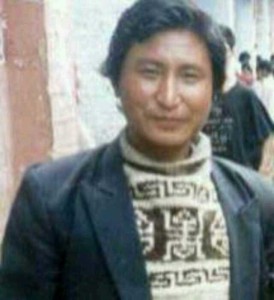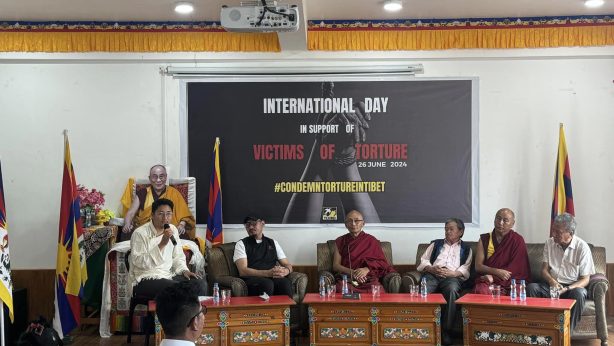Prominent political prisoner in critical condition on release after 17 years
A prominent Tibetan political prisoner, Jigme Gyatso, 52, was released recently after completing his 17 years’ prison term, according to exile Tibetan sources.
After his release, he is said to be in poor health struggling with multiple medical problems including weak eyesight, heart complications, kidney disorder and difficulty walking: all unmistakable signs that he had undergone years of torture, mistreatment and beatings during his imprisonment.
In April 2009, TCHRD issued an urgent statement calling for Jigme Gyatso’s release on medical grounds, after learning that Gyatso was seriously ill.[i] TCHRD’s concerns were based on the long history of Gyatso’s mistreatment and torture in detention centres and prisons in Tibet. Moreover, in February 2009, when relatives met Gyatso at Drapchi Prison Hospital, he appeared very frail and was suffering from a kidney problem. He could only walk with his back bended.

Gyatso was detained on 30 March 1996 in front of the Jokhang Temple in Lhasa. On 25 November 1996, he was sentenced to 15 years imprisonment and 5 years deprivation of political rights by the Lhasa Municipal Intermediate People’s Court on charges of ‘endangering national security’ in connection with establishing an illegal organisation and “incitement”. He was detained in Gutsa Public Security Bureau Detention Centre for one year and a month, where he was severely tortured and beaten. Gyatso described the treatment at Gutsa ‘the worst’ during his brief meeting with the UN Special Rapporteur on Torture, Dr. Manfred Nowak, who visited China, Xinjiang and Tibet in late 2005.
In April 1997, Jigme was shifted to Drapchi Prison where he served most of his prison term before his transfer to and incarceration in Chushul Prison in April 2005. Despite being seriously ill, he continued to serve his sentence in Chushul Prison. In May 1998, along with fellow inmates at Drapchi, Gyatso protested against Chinese authorities, prior to the visit of a troika of European Union Ambassadors. These protests were brutally suppressed and resulted in the death of eight prisoners, and sentences of at least 27 prisoners were increased.
In March 2004, Gyatso again protested shouting slogans such as “Long Live the Dalai Lama,” for which he was kicked and beaten, electric batons were used on his back and chest. His sentence was extended for two years, according to UN Special Rapporteur on Torture Dr Manfred Nowak, who met Jigme Gyatso on 27 November 2005 in Chushul Prison. Gyatso told Special Rapporteur Nowak that he had received a two-year sentence extension in May 2004 after shouting pro-Dalai Lama slogans.
Contrary to some reports saying that Jigme Gyatso was released one year earlier than expected, it appears that he was released because he completed his 17 years’ term.
The confusion surrounding Gyatso’ exact prison term apparently stems from the fact that the San Francisco-based Dui Hua human rights group in October 2009 announced that Gyatso’s sentence was extended by three years as punishment for shouting pro-Dalai Lama slogans in March 2004. In his testimony to the Congressional-Executive Committee on China, John Kamm, executive director of The Dui Hua Foundation said that Jigme Gyatso’s sentence “for setting up a pro-independence party is due to expire on March 30, 2014, and his health is said to be poor.”[ii] Mr Kamm added that Gyatso’ sentence was extended by three years.
TCHRD urges the Chinese authorities to ensure that Jigme Gyatso receives full medical treatment now that he has completed his prison term. Jigme Gyatso’s right to be accompanied by his surviving family members and relatives during the course of treatment should be respected. The Chinese authorities should refrain from its common practice of putting even released political prisoners under intrusive surveillance and monitoring. At the moment, Jigme Gyatso’s health and well-being are major concerns for many around the globe including human rights groups, activists and Tibetans alike. The Chinese government should release an honest statement providing latest information on Jigme Gyatso’s health condition and the circumstances under which he was released.
Background information
Jigme Gyatso was born in 1961 at Bartha Village in Sangchu (Ch: Xiahe) County in Kanlho (Ch: Gannan) Tibetan Autonomous Prefecture (Gansu Province), in the Tibetan province of Amdo. Jigme travelled to India in 1985 to receive a religious initiation. He stayed at Drepung Gomang Monastery in south India for a year and then returned to Tibet where he joined Gaden Monastery. In 1991 he became involved in pro-independence activities. He distributed independence leaflets and pasted posters on the walls around Gaden Monastery and nearby Lhasa City. Between 1988 and 1989, Gyatso was the leader of a secret youth organization called the “Association of Tibetan Freedom Movement.” In 1992, he organized one of the demonstrations that took place in Lhasa. Many of the demonstrators were arrested and detained by the Public Security Bureau (PSB) officers and officials from the anti-riot department. He was not arrested at that time although PSB suspected he was involved and kept him under strict surveillance.
Finally, on 30 March 1996, Gyatso was detained in front of the Jokhang Temple in Lhasa. He was subsequently sentenced to 15 years’ imprisonment and 5 years’ deprivation of political rights.
After his visit to Tibet in 2005, the UN Special Rapporteur on Torture Dr. Manfred Nowak made a strong recommendation for Jigme Gyatso’s release. “Since he has been convicted of a political crime, possibly on the basis of information extracted by torture, the Special Rapporteur appeals to the government that he be released,” Dr Nowak wrote in his report.
In 2000, the UN Working Group on Arbitrary Detention found that “the deprivation of liberty of Jigme Gyatso is arbitrary, being in contravention of articles 19 and 20 of the Universal Declaration of Human Rights and articles 19 and 22 of the International Covenant on Civil and Political Rights (ICCPR).”[iii] The working group further stressed that Jigme Gyatso’s actions never “advocated violence, war, national, racial or religious hatred, or any behaviour or practices” prohibited under the ICCPR and that he was “merely exercising the right to freedom of peaceful assembly with others in order to express opinions, a right guaranteed under articles 19 and 20 of the Universal Declaration.”
Endnotes:


